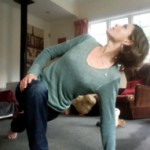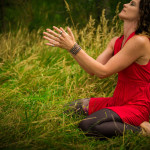You are currently browsing comments. If you would like to return to the full story, you can read the full entry here: “The Kundalini Awakening Process: An Inside Story”.
Similar Articles You May Enjoy
- On the Magic of Yoga Practice to Bring You Back to Presence
by Kara-Leah Grant I've had a rough few weeks, since moving into my new house with my three wonderful flatmates. First I caught a 12 hour vomiting bug that saw me curled up on my sister-in-law's bathroom for seven hours in child's pose, just moving to lift my head and…
- How to Make your Kundalini Awakening a Positive Event
By guest author Tara Springett, Buddhist Therapist and Teacher My own Kundalini awakened at the age of twenty four during three courses of bioenergetic therapy, in which we held painful body postures while screaming our heart out. It was a rough approach and it achieved what it set out to achieve:…
- When Kundalini Awakens. Now What?
WIN a copy of Kara-Leah's new book 'Field Notes from Kundalini Awakening', publishing in 2018. Guaranteed to take you on an intimate journey into the depths of the Kundalini experience. Click here to sign up for the book launch list and go into the draw to win one of THREE print…



Kara-Leah ~
Wow – thank you for sharing this. I do this as well, I just didn’t use the kundalini language that you speak. As you described your experiences of letting your body move (I just called it unwinding) and falling into a deep sleep, seemingly upon command and having letting go dreams and experiences… yeah, I do that too! I know a bit about yoga language, so this gives my experience a whole new dynamic to explore. I am smiling with gratitude, connection and joy. I’m not crazy and I’m not alone – YAY!
Hey Colleen,
Great to hear from you. An unwinding process… that’s it exactly… only not unwinding a day or a week… more like a life time or more.
Language is such a big thing… especially when it comes to awakening experiences. Because I’ve been practicing yoga for so many years, I’ve tended to use yogic language to describe my experience. But there are plenty of people out there having awakenings that aren’t practicing yoga etc… so what language is then appropriate?
It’s something I going to explore in an up-coming article as I think it’s really important to look at the words we use, the connotations that hold, and how they can stop us from directly experiencing our reality – whatever that might be.
Blessings,
KL
As Colleen said, it’s great to have a shared language that assuages any fear of craziness. Having recently visited a mental hospital & a hearing for someone trying to leave it, I’m acutely aware of the often silent & repressed fear most people have of being called crazy. It grieves me that allowing movement, sound & the release of energy is something we call abherrant & even lock people away & medicate them for. A clearer support system & understanding of the process might free more of humanity from the delusion of control we mostly operate under. In the meantime, thank you for your bravery, honesty & example of how “normal” a connection to life & energy can be, when understood & supported through crucible-like practices of stability (drinking water & clear-seeing, for example).
With gratitude,
Melissa
Hey Melissa,
Oh this is something you and I have talked about so many times… maybe we need to record an MP3 of our talks on awakening 🙂
Again – talking about it and grounding the experience in a broader context of reality is so powerful. Often, what makes us crazy is thinking we’re crazy – the mind gets all in a bind, anxious and freaking out because we have no context for what we’re experiencing.
Definitely worth exploring more in future articles!!!
Many blessings,
Kara-Leah